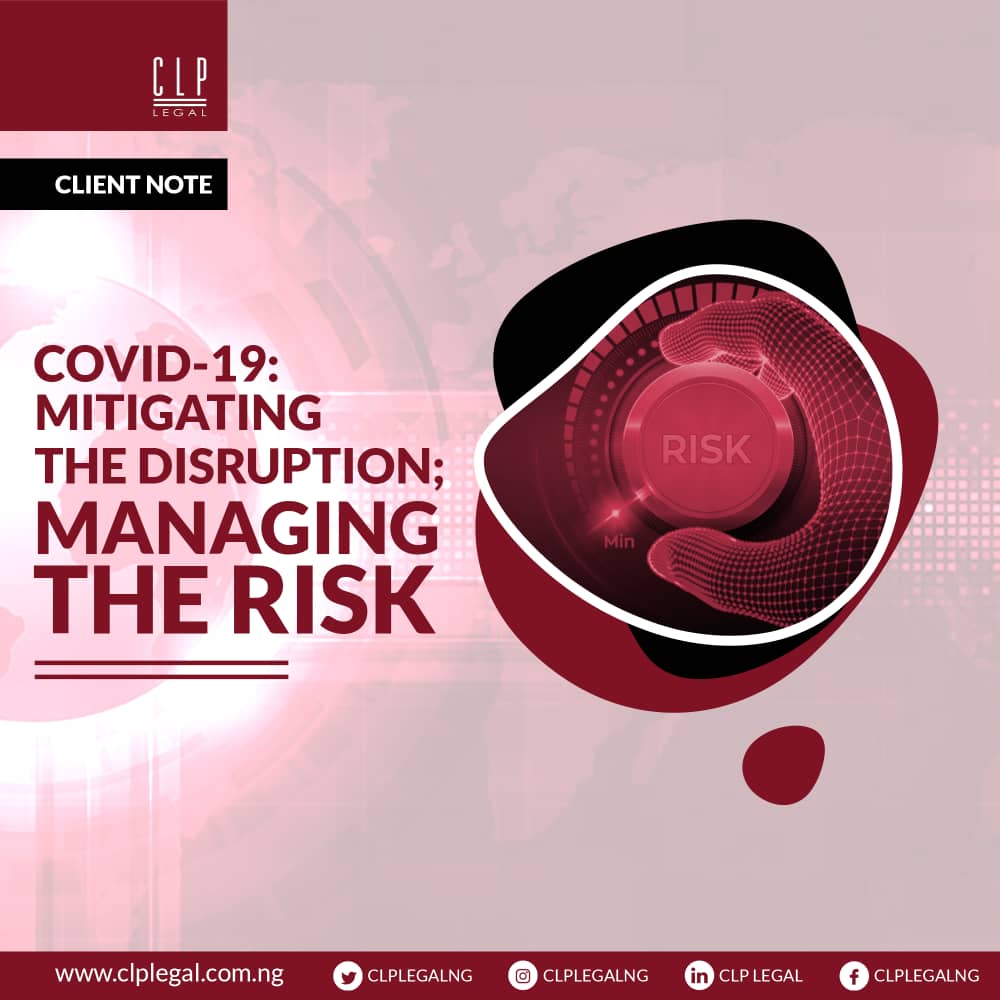
Insight
Covid-19: Mitigating The Disruption; Managing The Risk
INTRODUCTION
The outbreak of COVID-19 has led to unprecedented dislocation of family life, businesses and the world economy in our lifetime and changed the way we do things, perhaps forever.
As many businesses and organisations struggle to navigate the challenges, this Client Note identifies the key areas of legal risk exposure for businesses and seeks to assist clients in mitigating the disruption, while advising on practices that should be entrenched and institutionalised to manage risk in a post-pandemic world.
1.0 LABOUR AND EMPLOYMENT
1.1 Mitigating the Disruption
There are two categories of employees that the employer must deal with. The first category are the manual labourers/ clerical staff. These categories of staff have their employment protected at the baseline by the Nigeria Labour Act (the Act). The other category are staff not covered by the Act.
a) Wages
The employer must at the minimum, pay a day’s wages where there is a disruption that renders the employee incapable of working for one week or for such longer period approved by a labour officer. We are not aware that such a longer time has been approved. Beyond this and for other category of staff, their employment will likely be treated as disrupted by a supervening event – the COVID-19 pandemic – leading to suspension of work. In these circumstances, employers are not expected to pay wages as of right. It must be emphasised that this is only relevant where the employer cannot provide work for the staff due to the disruption. If the staff can work remotely or in any other manner, the suspension of work will not apply.
Workers who are absent from work for the purpose of quarantine or for undergoing preventive or curative medical care during an outbreak of a disease and whose salary is suspended should be granted a sickness cash benefit in accordance with international conventions.
b) Hours of Work
Where work can be provided, the Act enables an employer to make an adjustment to the number of hours a worker should put into work in unforeseen circumstances. The employer can also apply this to the other category of staff not covered by the Act as it is within the province of the employer to adjust working hours to adapt to unforeseen circumstances.
c) Remote Work
Where the employee is prevented from resuming daily at the traditional workspace provided by the employer, the employer is to enable the employee work remotely at home or at any other agreed work area.
d) Employee Compensation for Injury
An employee is entitled to compensation in the case of disabling injury whether it occurred in the workplace or outside the workplace. It is no excuse that the employee sustained the injury while working remotely.
e) Health and Safety
It is the duty of the employer to provide a safe work environment at no cost to the employee. The employer must where necessary and so far, as is reasonably practicable, provide adequate protective clothing and protective equipment, at no cost to the worker in the event of an outbreak.
Employers are also responsible for providing adequate information and appropriate training on Occupational Safety and Health (OSH); consulting workers on OSH aspects associated with their work; providing and measures to deal with emergencies.
Furthermore, workers have the right to remove themselves from a work situation that they have reasonable justification to believe presents an imminent danger to their life or health. When a staff member exercises this right, he or she shall be protected from any undue consequences.
These safety requirements are consistent with international best practices applicable by our courts in the absence of any provision in our laws.
f) Variation of the Employment Contract
This should be pursued by way of negotiations with the employees in areas of concern especially where the contract of employment is silent on it.
g) Temporary Leave of Absence without Pay
This is useful where the employer does not want to terminate the employee. It should ideally not last for too long. The employee can procure other jobs while on leave even without terminating his contract.
h) Review of Employee’s Work and Remuneration
The parties may review the scope of work to be done by the employee and how it will be done as well as the employee’s remuneration during the continuance of the disruptive event and beyond.
i) Termination of Contract
Termination of employment is an option that may have to be resorted to either as of necessity or because of the failure of negotiations between the employer and employee. The court is still on whether such termination occasioned by COVID-19 will technically amount to redundancy. It will mostly depend on the circumstances of each employer’s case.
1.2 Managing the Risk
The employer should make permanent the mechanism for risk management by enshrining in its policy and contract of employment, the framework to allow for the implementation of the above-stated proposals and others that might be thrown up in the event of future disruptions. Competent human resources consultant and lawyers are a necessity to achieve this.
2.0. CONTRACTS
2.1 Mitigating the Disruption
To enable businesses manage the extreme difficulty, if not impossibility, of meeting their contractual obligations, the relevant parties will have recourse to the terms of their contract, law, and apply common sense and conciliatory management skills. The first point of call should be the contract between the parties.
- Force Majeure Clause
Usually, the contract will provide for force majeure event. A force majeure clause protects a party from liability for the delay in the performance of its obligations under a contract due to an unforeseen event or circumstance beyond the party’s control. Typically, a force majeure provision does not excuse a party from performance completely but only suspends performance of the obligation. However, the application of the clause and its consequence(s) will depend on the precise wording used in the clause. A force majeure clause often sets out the events which would qualify as force majeure events. Accordingly, businesses affected by the pandemic should review the force majeure provisions in their existing contracts to determine if its coverage can be extended to epidemics, pandemics and / or government orders.
A force majeure provision will only avail a party if the force majeure event completely hampered its ability to discharge its obligations. Force majeure cannot be invoked simply because the contract has become more difficult or costly to perform.
- Frustration
Frustration is the premature determination of a lawful contract due to a subsequent change in circumstances which was not contemplated by the parties, and which has made performance of the contract impossible, illegal or something fundamentally different from that which was contemplated by the parties at the time they entered into the contract.
Frustration need not be stipulated in a contract to be applicable. The pandemic and the consequent government restrictions and orders were not anticipated and, will thus, qualify as frustrating events depending on the nature of the contract.
- Renegotiation/Waiver
Another alternative available to parties in the wake of the pandemic would be to renegotiate and, where possible, vary the terms of their contract to accommodate and mitigate the disruption. Some obligations can be waived by the benefitting party.
2.2. Managing the Risk
Going forward, parties may adopt the following measures to manage the risks associated with epidemics/pandemics and the occurrence of unforeseen circumstances or events.
- Risk identification: Parties should identify the new business risks posed to their business and make provision for them in their contract.
- Force Majeure clauses: A force majeure clause has become crucial in any commercial agreement. The clause must enumerate public health emergencies/exigencies as part of force majeure events.
- Amendment of contracts: In addition to the force majeure clause, a contract may contain provisions that allow parties to renegotiate its terms in the event of the occurrence of certain events that will be revealed by the risk analysis or an unforeseen event which impacts on the performance of the contracts.
- Competent legal advisers: Businesses should always engage competent legal advisers to draft and / or negotiate their commercial agreements.
3.0 CORPORATE GOVERNANCE
3.1 Mitigating the Disruption
Companies can adopt the options below in respect of their board meetings and annual general meetings.
a) Meetings of the Board of Directors
The directors can hold virtual meetings. The directors can pass a resolution authorising such a meeting and deem a chosen venue preferably the company premises as the venue of the meeting. The need to authorise a venue is because the law requires that there must be stated in the notice of the meeting a physical venue and since the directors are likely to be calling in from different locations, one of these locations must be chosen as the venue.
Out of caution, all the directors should sign the minutes of the virtual meeting. The law allows for decisions/resolutions to be passed in lieu of meetings by directors since they may not always be available to have physical meetings. This will give additional protection and validity to the decisions taken at the virtual meeting.
Flowing from this, the directors need not meet to take decisions. A call at which a decision is reached, or an explanatory note circulated to all online with a request to sign the resolutions proposed therein or on the call is enough as long as all the directors sign such resolutions. They are as valid as any decision reached at a board meeting.
The Nigerian Stock Exchange (NSE) on 15th April 2020 released a set of guidelines to guide publicly quoted companies in convening virtual meetings, taking into consideration the present situation. Companies may look into these guidelines to adopt some, or all of the recommendations made. The guidelines can be accessed at http://www.nse.com.ng/dealing-members-site/Notices/NSE%20GUIDANCE%20ON%20COMPANIES%20VIRTUAL%20MEETINGS.pdf.
Summary
- Fix and hold a virtual meeting.
- Pass a resolution authorising the virtual meeting as the first item at the meeting.
- All the directors should sign the minutes of the virtual meeting.
- In the alternative and when required, all the directors can sign a resolution authorising/approving or ratifying an act or decision.
b) Company Annual General Meetings (AGM)
AGMs must hold once every year and not more than 15 (fifteen) months apart from the previous AGM unless authorised by the court. Unlike board meetings, the law mandates AGMs to be held in Nigeria.
The AGM can comply with the social distancing requirement and overcome the restrictions on travelling using proxies to limit the gathering to not more than 20 (twenty) persons. Members of a company will have to execute a proxy form authorisng a limited number of persons among them to represent their interest at the AGM. They can still be part of the AGM if the event is streamed online.
The Corporate Affairs Commission, Abuja (CAC) issued guidelines for the holding of AGMs by using proxies. In practical terms, this will apply only to the companies with many shareholders, usually public companies. The guidelines can be accessed at https://www.cac.gov.ng/wp-content/uploads/2020/05/GUIDELINES-ON-HOLDING-OF-ANNUAL-GENERAL-MEETINGS..pdf
For small companies with few members, a resolution executed by all the shareholders in writing is as valid as decisions/resolutions passed at the AGM.
3.2 Managing the Risk
Amendment of the Company’s Articles of Association
The company should amend its articles of association to provide for virtual board meetings.
4.0 DATA PROTECTION
The COVID-19 pandemic has forced the pervasive use of technology by mankind to meet their obligations.
The increased reliance on digital solutions has increased the challenge of data protection for many companies. Now, more than ever, companies must place more regard for the protection of personal data (individuals’ personal information like names, religious preferences, political beliefs, sexual orientation, health status and so on) and confidential information.
In serving clients, organisations have access to the personal and other confidential data of clients and third parties. By virtue of the various data protection legislation, it is the responsibility of such organisations to ensure the protection of clients’ personal data and confidential information. The urgency with which companies had to migrate to digital solutions and alternative work arrangements posed the risk of inadequate measures to protect personal data and confidential information.
The work-from-home arrangement for example has the potential of exposing the personal data of clients to unauthorised access like family members of employees and friends.
4.1 Mitigating the Disruption
- Ensure that truly confidential matters or the release of private information are only mentioned on platforms with end-to-end encryption like WhatsApp. Please ask questions to ensure that the other side has not compromised the end-to-end nature of the encryption.
- Use gadgets that do not contain very private or confidential information to conduct virtual meetings.
- Make sure that you are not in a position where private matters will be captured on video during meetings.
4.2 Managing the Risk
- a) Risk Analysis of Digital Solutions
Companies must carry out a comprehensive risk analysis of the current digital solutions that they are now using with a view to deploy the most protective of personal data and confidential information.
- b) Upgrade Security Measures
Regulation 2.6 of the Nigeria Data Protection Regulations 2019 imposes obligations on people involved in data control or processing to develop security measures to protect such data. It provides:
“Anyone involved in data processing, or the control of data shall develop security measures to protect data; such measures include but not limited to protecting systems from hackers, setting up firewalls, storing data securely with access to specific authorised individuals, employing data encryption technologies, developing organisational policy for handling personal data (and other sensitive or confidential data), protection of emailing systems and continuous capacity building for staff.”
The above provision effectively captures the duties on companies as it relates to protection of data and indeed all confidential information.
c) Formulation of Work-from-home policy
The work-from-home policy will guide the use and processing of confidential information while working from home or anywhere outside the office. This policy should regulate such things as the kind of devices to use when working outside the office, the guidelines and security measures to adopt, etc.
This policy should also address issues such as what to do in situations of loss of devices containing personal data, use of shared systems, encryption methods, use of backups, cybersecurity measures/prevention of cyber-attacks, authentication requirements before documents in Google Drives, for instance, are accessed, disposal policy where confidential information are printed on paper, deletion policy, among others.
d) Orientation of employees
Since most of the responsibility for compliance rest on employees, they must be repeatedly made to appreciate the significance of the responsibility for data protection.
e) Appointment of Data Protection Officers
Similarly, organisations must now take seriously the appointment of Data Protection Officers as provided by the Nigerian Data Protection Regulations (NDPR0 2019) to ensure compliance with data protection policies and regulations. The appointed Data Protection Officers must be effective in monitoring compliance with the measures put in place to safeguard personal data. They should also identify ways in which the existing systems can be improved to further guarantee data privacy.
f) Provision of Personal and Customised Laptops
Organisations which have not already done so, should begin to consider the provision of personal laptops for its employees. These laptops should be fitted with adequate firewalls and cybersecurity features that will prevent unauthorised access and restrict the transfer of confidential information from such systems. In the event of a data breach, this will also make it easier to track the source of such breach and provide appropriate remedy.
5.0 OTHER RISK MANAGEMENT STRUCTURES
5.1 INSURANCE POLICIES
Our world has become more vulnerable to the scourge of various life-threatening and economically crippling outbreaks of deadly diseases, epidemics and pandemics, as seen from the previous outbreaks of Severe Acute Respiratory Syndrome (SARS), Middle East Respiratory Syndrome (MERS) H1N1 virus, ZIKA virus and Ebola virus in the last two decades alone. Businesses are thus advised to adapt to the times and henceforth, take out insurance policies such as a business disruption insurance, events cancellation insurance, and specifically a pandemic insurance policy. A thorough analysis and interface by business commercial teams with insurance companies to understand the policies available and the extent of coverage and requirements for an effective insurance policy that will protect against losses is suggested.
5.2 ELECTRONIC SIGNATURES
Policies on electronic signatories should be put in place as hard copy documents will naturally be de-emphasised to a large extent going forward as online transactions increase exponentially.










